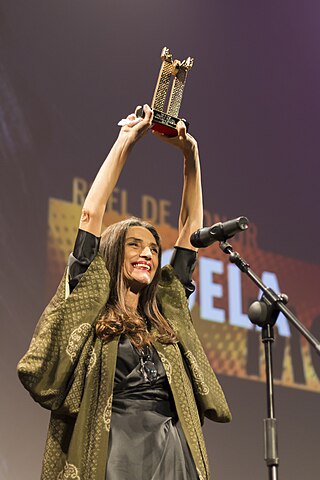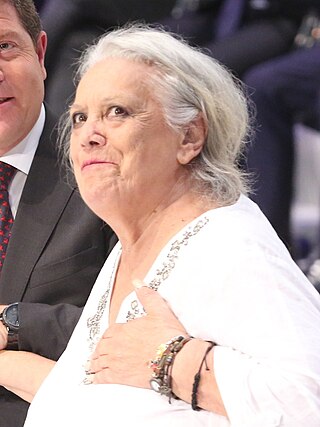Related Research Articles

The art of motion-picture making within Spain or by Spanish filmmakers abroad is collectively known as Spanish Cinema.

Basilio Martín Patino was a Spanish film director, specializing in a creative approach to documentary works. Patino produced pieces on the Spanish Civil War, the famous dictator (Caudillo), or his executioners. He also produced fiction. Patino often experimented with new technologies, including digital tools, 3D, and offline editing.

Ángela Molina Tejedor is a Spanish actress. Aside from her performances in Spanish films, she has starred in multiple international productions, particularly in a number of Italian films and television series.

Vicente Aranda Ezquerra was a Spanish film director, screenwriter and producer.

José Luis López Vázquez de la TorreMMT was a Spanish actor, comedian, costume designer, scenic designer and assistant director. He was best known internationally for his lead role in the surrealist horror TV film La cabina. A prolific performer, he was an integral part of Spanish cinema for six decades, appearing in almost 250 films between 1948 and 2007.

The Tower of the Seven Hunchbacks is a 1944 Spanish mystery film directed by Edgar Neville. It is based on a novel of the same title by Emilio Carrere.

Eloy de la Iglesia was a Spanish screenwriter and film director.

José Manuel Martín Pérez was a Spanish film and television actor, radio broadcaster, and screenwriter. He was a popular character actor in Spanish cinema during the 1950s and 60s, best remembered for playing villainous henchmen, appearing in more than 100 film and television productions.

The Battalion in the Shadows is a 1957 Spanish drama film directed by Manuel Mur Oti.
Juan Simón's Daughter is a 1935 Spanish musical drama film directed by Nemesio M. Sobrevila and José Luis Sáenz de Heredia. It is based on the musical play La hija de Juan Simón by Sobrevila. A second film version Juan Simón's Daughter was released in 1957.

Teresa Marta Ruiz Penella, better known as Terele Pávez, was a Spanish actress. She appeared in more than ninety films since 1954.
Ideal is a daily Spanish language newspaper edited and published in Granada.
Dakota Joe or Man and a Colt is a 1967 Argentine Spaghetti Western film directed by Tulio Demicheli, produced by Alberto Grimaldi, and starring Robert Hundar, Fernando Sancho, Gloria Milland, Mirko Ellis, Luis Gaspar, and José Canalejas.
Here Are the Aguilares! is a 1957 Mexican musical comedy Western film written and directed by Jaime Salvador, and starring Luis Aguilar, Antonio Aguilar, Rosa de Castilla and Lucy Gallardo. The film's sets were designed by art director Jesús Bracho. It is considered among Luis Aguilar's most famous works.
Nacional III is a Spanish comedy film from 1982 directed by Luis García Berlanga and written by him together with Rafael Azcona, the third part of the trilogy about the Leguineche family after La escopeta nacional (1978) and Patrimonio nacional (1981).

Moors and Christians is a 1987 Spanish comedy film directed by Luis García Berlanga. The cast features Fernando Fernán Gómez, Verónica Forqué, Agustín González, Chus Lampreave, José Luis López Vázquez, Andrés Pajares, María Luisa Ponte, Antonio Resines, Pedro Ruiz and Rosa María Sardá.

Sleepwalkers is a 1978 Spanish film written and directed by Manuel Gutiérrez Aragón starring Ana Belén alongside Norman Briski, María Rosa Salgado, Lola Gaos and José Luis Gómez. It was selected as the Spanish entry for the Best Foreign Language Film at the 51st Academy Awards, but it was not nominated.

Sleepless in Madrid or Insomnia is a 1998 Spanish comedy film directed by Chus Gutiérrez. It stars Cristina Marcos, Candela Peña, Ernesto Alterio, María Pujalte and Ginés García Millán.
The so-called comedia madrileña or nueva comedia madrileña was a film trend or film label for urban comedies in Spain that emerged during the Transition. It was led by filmmakers such as Fernando Colomo and Fernando Trueba.
Something Bitter in the Mouth is a 1969 Spanish film directed by Eloy de la Iglesia. It is a blend of psychological thriller, erotic-intimist melodrama and sociopolitical parable.
References
- 1 2 Rosanna Maule (2008). Beyond Auteurism: New Directions in Authorial Film Practices in France, Italy and Spain Since the 1980s. Bristol; Chicago: Intellect Books. p. 37. ISBN 978-1-84150-204-5.
- 1 2 3 "Film Ideal, la mítica revista de cuando el cine era extraodinario". Spoonful (in Spanish). 3 May 2012. Retrieved 3 February 2017.
- ↑ Iván Tubau (1984). Hollywood en Argüelles: cine americano y crítica española (in Spanish). Barcelona: Edicions Universitat Barcelona. p. 62. ISBN 978-84-7528-116-2.
- 1 2 3 4 5 Ferran Alberich; et al. (2015). "Film clubs, festivals, archives and magazines". In Jo Labanyi; Tatjana Pavlović (eds.). A Companion to Spanish Cinema. John Wiley & Sons. p. 457. ISBN 978-1-119-17013-6.
- ↑ L. Carol Gerones (2014). "Dracula, the Vampire in Catalonia. Between literature and cinema through Pere Gimferrer". Catalan Review. XXVIII. ISSN 0213-5949.
- 1 2 3 Jeroen Vandaele (2014). "The National-Catholic Versions of Billy Wilder's Broadway Adaptations". In Francesca Billiani (ed.). Modes of Censorship: National Contexts and Diverse Media. London; New York: Routledge. p. 335. ISBN 978-1-317-64032-5.
- 1 2 Antonio Lazaro-Reboll (2012). Spanish Horror Film. Edinburgh: Edinburgh University Press. p. 77. ISBN 978-0-7486-7062-8.
- ↑ Alberto Mira (2005). "El Extraño Viaje/ Strange Journey". In Alberto Mira (ed.). The Cinema of Spain and Portugal. London: Wallflower Press. p. 119. ISBN 978-1-904764-44-1.